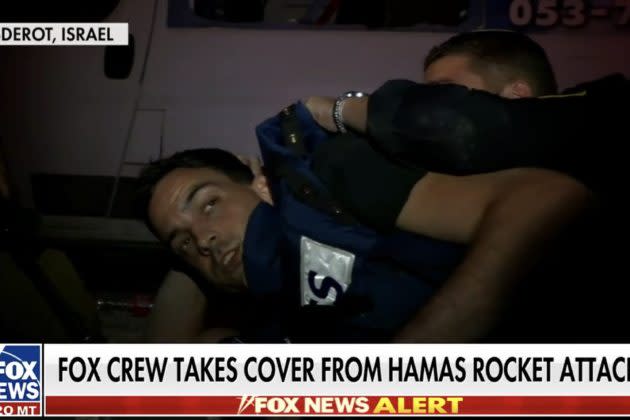How CNN, Fox News and Others Scrambled to Cover Horrific Scenes in Israel: ‘We Haven’t Seen Anything Like This for Decades’
- Oops!Something went wrong.Please try again later.
- Oops!Something went wrong.Please try again later.
- Oops!Something went wrong.Please try again later.
- Oops!Something went wrong.Please try again later.
- Oops!Something went wrong.Please try again later.

News correspondents are trained to keep their emotions in check, but sometimes a story comes along that makes such a feat all but impossible.
Anderson Cooper, Richard Engel, Holly Wiliams, Trey Yingst, Matt Gutman and Clarissa Ward have been seen on camera in recent days trying to report on a horrific event that is emotionally draining: the invasion of Israel by Hamas militants, replete with violence, hostage-taking and explosive force.
More from Variety
Chris Cuomo Travels to Israel for NewsNation: 'That's The Job'
Israeli Actor David Cunio Reportedly Abducted by Hamas Along With Wife, 3-Year-Old Daughters
Lester Holt Talks NBC News' Israel Coverage: 'I Think This Will Be A Long TV Deployment'
“I’ve seen many challenging things so far,” says Yingst, the Fox News correspondent who is based in Israel and has been reporting on the attack since October 7, when he held forth from his own balcony. He responded to questions via email. “We arrived in the south as Palestinian militants were still killing and kidnapping Israelis. One of the first things I saw was an Israeli soldier die in front of me at an evacuation point near the border. We also watched as bodies were stacked into a pickup truck after being pulled from the Sderot police station. These are gruesome scenes, but show the reality of war.”
TV news networks in the U.S. were keeping their focus close to home with a bevy of events tied to the 2024 presidential election. Now they’re finding themselves pulled overseas. The three broadcast network evening newscasts dispatched their anchors — David Muir, Lester Holt and Norah O’Donnell — to Israel. MSNBC sent Ali Velshi to the region, and NBC News’ longtime foreign correspondent Engel was spotted trying to find cover. Outlets like NewsNation and Scripps News are also on the story, with the Nexstar-backed cable network sending prime-time host Chris Cuomo to Israel and Scripps preparing a Thursday-night special led by international correspondent Jason Bellini.
Viewers may be used to seeing violent scenes on the TV news, says CNN’s Ward, but the invasion in Israel presents something well beyond the norm. “I think everyone has been pretty shocked by these large-scale massacres,” she says. Her team visited the site of the Nova music festival, where Israeli citizens were killed, “and the ground was still strewn with abandoned vehicles that had been shot up, with the bodies of Hamas militants who had infiltrated the border,” she recalls. “I don’t think we have seen anything like this for decades, certainly not in my time.”
Typical TV news coverage shows journalists in a relatively safe space, delivering a report while the action plays out in the distance. Coverage of the new war in Israel does not allow for such a remove. Hamas’ taking of Israeli hostages has spurred interviews with family members seeking help in bringing their loved ones back home. “CBS Mornings” co-anchor Tony Dokoupil disclosed his own stake in affairs: Two of his children and his ex-wife live in Israel.
Indeed, some journalism personnel are coming face to face with horror. “I have seen the most awful things that can be done to people of all ages — babies, older women, young teens — scenes that I will never forget,” says Yonat Friling, a senior field producer for Fox News who is typically stationed in Jerusalem. And daily lives are disrupted. “The streets are silent, shops are closed, and no people are walking around. There is a heavy army and police presence, and the smoke from the rockets and the airstrikes fills the air,” says Friling.
On Oct. 9, Ward and her team were on camera when blasts went off; they had to seek shelter in a nearby ditch, while viewers watched the group ensure their own safety. The correspondent says she has seen “the rocket fire coming into Israel, the Hamas militants running around, skirmishes with IDF, sustained bombardment of Gaza.” But she is “just trying to go out every day like all of our colleagues and get a sense of what is going on and how best we can cover it.”
Both Ward and Yingst say they have been able to get around without too much hazard. “Gaza is impossible to reach right now,” says Yingst, although on the Israeli side, “the military has allowed us access to areas right along the Gaza border where the bodies of dead militants still lay.”
The assignment brings with it grueling hours. Both correspondents say they have been doing multiple hits per hour, and working throughout the day so they can deliver updates to audiences in the morning and in primetime. They may be in place for quite some time, says Ward: “It’s very difficult to predict these things, but it certainly doesn’t feel like we are going anywhere anytime soon.”
Best of Variety
Sign up for Variety’s Newsletter. For the latest news, follow us on Facebook, Twitter, and Instagram.
